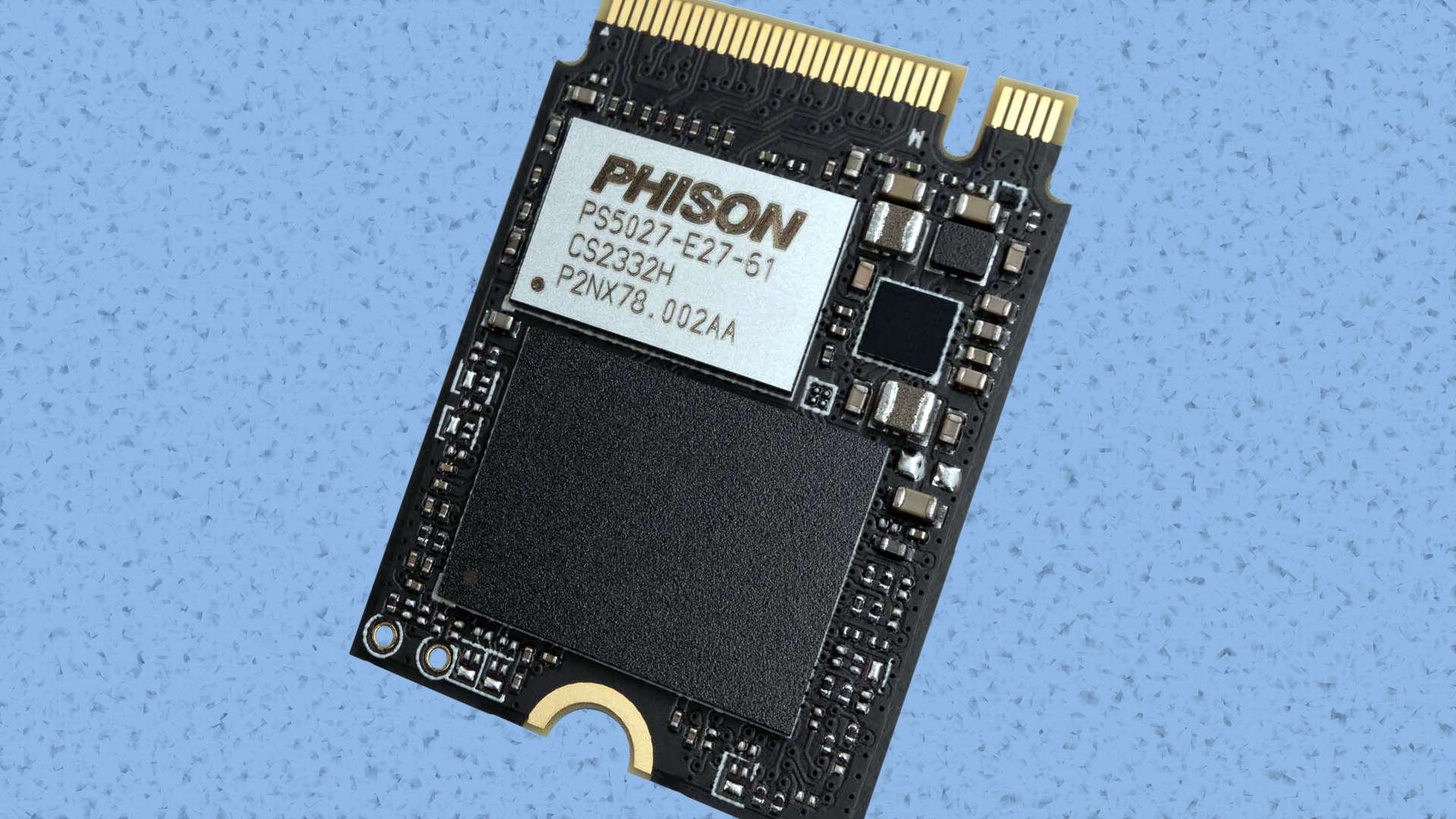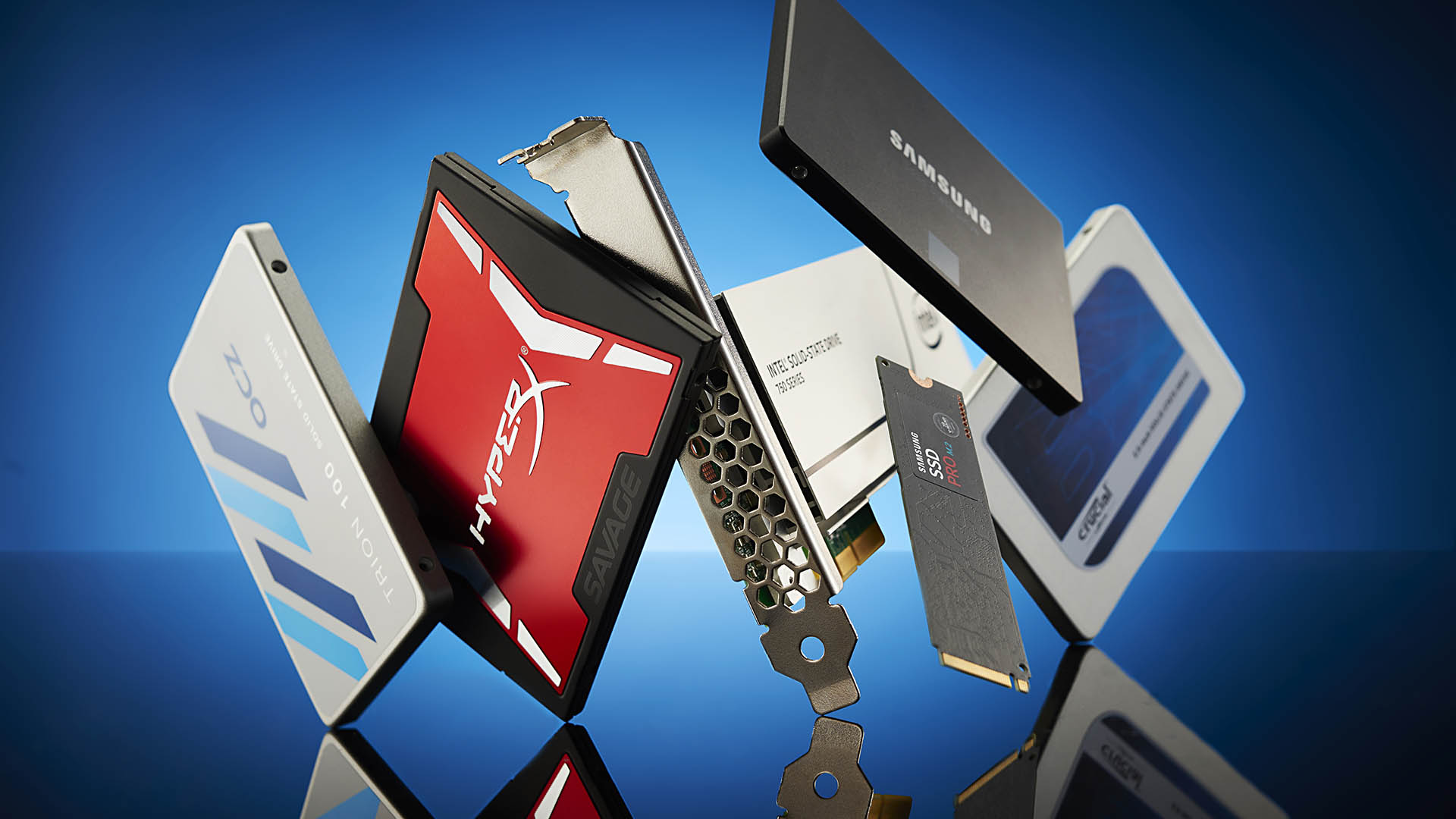Ultra-fast PCIe 4.0 storage is heading to handheld PCs, thanks to Phison's new 2230 SSD controller
Laptop, office PCs, and top-tier gaming rigs and workstations are getting new chips, too.

Handheld gaming PCs have quite specific needs, when it comes to storage. It needs to be very compact, with low power consumption, but offer fast transfers at the same time. SSD controller wizards Phison has launched three new chips at this year's CES event and one of them is the perfect match for SSDs designed for the Steam Deck and other portable PCs.
The most interesting controller announced is the PS5027-E27T. Where the other two are PCIe 5.0, this one uses the older 4.0 specification, but it's still good enough to offer sequential read/writes up to 7400 and 6700MB/s, respectively. The decision to scale the transfer rates back is to keep the power consumption (and therefore heat output) as low as possible, with L1.2 low power state being less than 5mW.
Although not exclusively targeted at this market, the E27T is an ideal SSD controller for handheld gaming PCs. The best M.2 2230 drives you can get for the likes of the Steam Deck typically use Phison's E21T chip, which has peak sustained read/write speeds of 5,000/4,500MB/s.
So, on those figures alone, the E27T is a substantial improvement. It also supports up to 8TB of 3D TLC and QLC flash memory, with the best performance achieved when using 2TB or more. But even the smallest configuration of 512GB will still be better than anything you can get for your portable PC right now.
Phison's other new models are the PS5031-E31T and PS5026-E26 'Max14um'. The former and the aforementioned E27T are so-called DRAM-less controllers. That means any SSDs built with these controllers won't have any DDR memory chips on the circuit board.
These are typically used to store an enormous map of what data is stored on the drive and where it is. DRAM-less storage drives have to use a portion of the SSD's own capacity and it does affect the maximum, sustained performance you can get out of the drive.
Aimed at the mainstream PC industry, the E31T is still pretty cutting edge, using a PCIe 5.0 interface to handle data and instruction transfers. Built on TMSC's N7 process node (the same one used for AMD's RDNA 2 graphics chips, for example), it's designed to use as little power as possible. Not only does that make it ideal for laptops but less power means less heat, which is good news for any PC.
Keep up to date with the most important stories and the best deals, as picked by the PC Gamer team.
Peak performance is claimed to be 10,800MB/s for sequential read/writes, which is more than enough for pretty much any PC gamer. Of course, any SSD using this controller won't automatically be that fast, but at least the scope is there.
| Row 0 - Cell 0 | E31T | E27T | E26 'Max14um' |
| Host interface | PCIe 5.0 x4 | PCIe 4.0 x4 | PCIe 5.0 x4 |
| Flash controller | 4 channels, 16 chip enables, 3,600MT/s | 4 channels, 16 chip enables, 3,600MT/s | 8 channels, 32 chip enables, 2,400MT/s |
| Max sequential read | 10,800MB/s | 7,400MB/s | 14,000MB/s |
| Max sequential write | 10,800MB/s | 6,700MB/s | 12,000MB/s |
| Max 4K random read | 1,500K IOPS | 1,200K IOPS | 1,500K IOPS |
| Max 4K random write | 1,500K IOPS | 1,200K IOPS | 2,000K IOPS |
Polar opposite to the E31T is the new E26 'Max14um' controller, packed with twice as many flash channels and chip enable signals as the lower powered processor. It uses DDR4 or LPDDR4 for maximum performance and Phison is claiming the PCIe 5.0 chip supports up to 14,000MB/s and 12,000MB/s sequential read and write data rates.

Best SSD for gaming: The best speedy storage today.
Best NVMe SSD: Compact M.2 drives.
Best external hard drives: Huge capacities for less.
Best external SSDs: Plug-in storage upgrades.
That's… umm… a lot, but to ensure the chip doesn't melt through the surface of the Earth, it's fabricated on TSMC's 12FFC+ node. You might think this is a little odd, given that it's an older and less compact process compared to the N7 used to make the E31T, but it's about balancing manufacturing costs against power consumption and chip size.
Phison's controller chips are used by Crucial, Corsair, Sabrent, Nextorage, and many others so you can be sure that these new models are going to be used in the best SSDs launched this year.
The fastest ones you can get right now are blindingly quick but also very expensive and get pretty hot, so hopefully the E31T, E27T, and E26 can help bring down costs and temperatures.
We'll let you know as soon as we get our hands on any SSD using Phison's latest chips.
_____________________________________
PC Gamer's CES 2024 coverage is being published in association with Asus Republic of Gamers.

Nick, gaming, and computers all first met in 1981, with the love affair starting on a Sinclair ZX81 in kit form and a book on ZX Basic. He ended up becoming a physics and IT teacher, but by the late 1990s decided it was time to cut his teeth writing for a long defunct UK tech site. He went on to do the same at Madonion, helping to write the help files for 3DMark and PCMark. After a short stint working at Beyond3D.com, Nick joined Futuremark (MadOnion rebranded) full-time, as editor-in-chief for its gaming and hardware section, YouGamers. After the site shutdown, he became an engineering and computing lecturer for many years, but missed the writing bug. Cue four years at TechSpot.com and over 100 long articles on anything and everything. He freely admits to being far too obsessed with GPUs and open world grindy RPGs, but who isn't these days?

